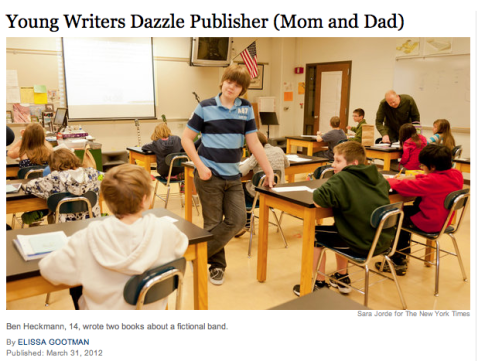
HOW DARE THEY
There’s a recent New York Times piece some friends and I were discussing on Twitter this morning. It’s about teenagers self-publishing their work, usually financed by their parents. Now, there are a lot of newspapers in the world, but the Times stands alone in its ability to draw me in and then enrage me. And man, did it ever with this article. But not how I think it wanted to.
Read it here. Right from the start, I know how the article wants me to feel about this. “Young Writers Dazzle Publisher (Mom and Dad)”. This article wants me to hate these entitled fucks before I’ve even met them! How do I know the article wants me to feel this way? Because you can still see the original (or at least alternate) headline in the URL:
Clearly, “Young Writers Dazzle Publisher” works better. After all, it’s a phrase you’ve seen in the Times on countless occasions — in this context, of course, it’s meant to provoke rage on purpose. Even if they hadn’t added “(Mom and Dad),” you’d have gotten to paragraph three and wanted to murder the precocious boy-human known as Ben Heckmann, and his parents, who are probably wiping their assess with hundred-dollar bills.
How is this different from the New York Post, by the way, which passes judgment on its subjects with the regularity of time itself? It’s all in the headline. If this story had appeared in the Post, the headline would’ve been something like
HIGH A-CHEEVERS OR SPOILED BRATS?
But that’s not how the Times plays it, baby. The Times plays it arch, all the way. Give it a headline that could read as completely innocuous, but was 99% likely sneered through a rolled-up copy of N+1.
So we get the headline, we get examples of some kids who are writing novels and having them published by their parents. We’re already supposed to be irritated with all this. And then we’re given the Expert Testimony.
Expert #1: Tom Robbins, who is described as a “novelist” (I’m just kidding; I read him, too, when I was 20), says,
“What’s next? Kiddie architects, juvenile dentists, 11-year-old rocket scientists? Any parent who thinks that the crafting of engrossing, meaningful, publishable fiction requires less talent and experience than designing a house, extracting a wisdom tooth, or supervising a lunar probe is, frankly, delusional.” […] “There are no prodigies in literature,” Mr. Robbins said. “Literature requires experience, in a way that mathematics and music do not.”
That’s a real statement, or rather, an actual set of words that have the appearance of forming a coherent statement. Because I have no idea what he’s talking about. But we’ll get to that in a minute.
Expert #2: Garth Stein, author of the bestseller The Art of Racing in the Rain,
said he saw how publishing could be great fun for children, but cautioned that “part of writing is living and exploring the world and interacting with the world.”
Good point. The kids in the Times piece range from 12-16. Everyone knows you don’t begin experiencing or living or interacting with the world until you’re, what? 18? 20? Before then, you’re just a potato in Keds. (Yeah, heads up, youths: Grownups all think you’re still wearing Keds.)
Expert #3: “Alan Rinzler, a publishing industry veteran who now works with writers as an editorial consultant.” I’ll just paraphrase what he says:
You should spend even more and hire me!
So that’s the article. And I’m sure plenty of people are outraged at these precocious jerks and their overindulgent parents. And I’m sure those same people will agree with the implication that having your parents publish you will dissuade you from doing the Hard Work of being a writer. (That’s the assertion in the Gawker headline.) But consider, if you will, the toxic levels of batshittery in Tom Robbins’ comments. And why are they batshit? Because they presume that a person is literally incapable of writing a good story until they’ve lived a certain number of years. How many years? Tom Robbins doesn’t say. But I’m willing to bet it’s as many years as Tom Robbins was when he wrote Even Cowgirls Get the Blues. And even though Robbins’ criteria would fail a 9th grade logical syllogism test, it’s the same criteria Gawker and others are using to judge this “story.”
By the way, is this an epidemic? Are there as many kids writing and self-publishing novels as there are having unprotected sex? Because that would be something. In reality, it seems like this is a handful of super-driven kids with supportive parents. Which is terrible, I guess? I know Gawker sure thought so.
I guess I’m crazy, because I actually loved the thought of a 14- or 16-year-old kid creating a book and putting it out there for other people to read. That’s something I never would’ve thought to do at that age. And if I had thought of it, I surely wouldn’t have had the balls to do it. But we should be damning such behavior, shouldn’t we? Let’s not encourage young writers. Let’s make sure they know the most important thing about a work of fiction isn’t how it’s written or how it makes the reader feel, it’s how it came to be published. Let’s make sure they know there’s only ONE way to do things in this world. Let’s make sure they know they’re not to put their work out in the world when they feel ready to do so, only when WE feel ready. Whoever “we” is, and whenever “when” means.
By the way, I realize I’d have popped a blood vessel if the article had instead been about a trend in traditional publishers signing teen and tween authors. But I now realize I’d have been wrong to do so. And for THAT, I thank Tom Robbins, the New York Times, and Gawker.

